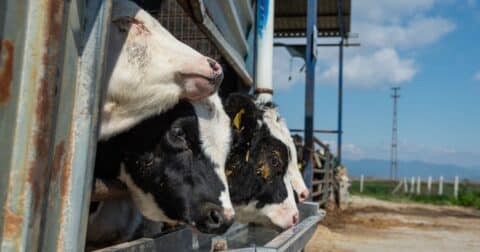Investigation
Industry Groups Worked to Expand Wisconsin Bill Meant for Small Dairies
Factory Farms•7 min read
Investigation
A new law would allow the livestock industry to fast-track federal review of feed additives.


Words by Grace Hussain
A new feed additive intended to reduce methane emissions in dairy cows is now the first of its kind to be allowed for sale in the United States. Sold under the brand name Bovaer, the drug passed FDA review in just under twelve months, far shorter than industry standard. Now some lawmakers want to make this fast-tracked process standard for the entire feed industry — an industry that has billions of dollars riding on the so-called “climate-friendly” meat and milk market.
Bovaer’s manufacturer, Elanco, may not be a household name, but the veterinary pharmaceutical maker is poised to play a critical role in marketing industrial meat and dairy as sustainable. If the proposed law were to pass, it would be a financial boon to an industry that is projected to be valued at nearly $100 billion by 2027.
Feed companies like Cargill and their trade associations back the policy change. Cargill spent over $1.3 million on lobbying in 2023, and the American Feed Industry Association employed four DC lobbyists last year to help push for the proposed legislation.
Bovaer, or 3-nitrooxypropanol or 3-NOP, is already being sold for use in both beef and dairy production in more than 50 countries. The drug’s compound works by inhibiting the enzyme responsible for producing methane inside the cows’ intestines. And according to Elanco’s testing, the drug can cut methane emissions by 30 percent for dairy cattle. But the FDA did not independently test these claims and a metaanalysis of 3-NOP trials has found a wider range of results. Sentient has submitted a public records request to review what Elanco subitted to the FDA.
Now that Bovaer is available for use in the U.S., Elanco can allow the farmers who participate in the carbon credit market it funds, Athian, to feed the new drug to dairy cows and claim the carbon credits.
Athian is a different model of carbon market. Typical carbon markets work by allowing companies and groups to monetize various forms of climate action. Even though touted as an essential part of global climate action by the United Nations, many carbon markets have been criticized for high rates of fraud and worthless credits.
Earlier this year, Athian hosted its first sale of carbon credits, at the time generated by a dairy farm that fed its cows a different Elanco-owned feed additive. Called Rumensin, this drug is used to stimulate increased milk production in dairy cows.
Athian works differently, by selling what are called “carbon insets,” which are different from the traditional model of “carbon offsets.” Typical offsets allow companies to pay someone else, like a conservation group, to plant trees or rewild barren farmland as a way to offset their own pollution. Carbon insets, on the other hand, are a newer idea: these give polluting companies the ability to trade on their own efforts to slash emissions in their supply chain.
Critics of insets say that many of these reductions should be taking place across polluting industries anyway, not giving the companies even more financial incentives to do what is necessary to reduce food sector emissions. Feed additives are a perfect example. The dairy industry is fueling 11 percent of methane emissions each year — with a single dairy cow able to emit up to 264 pounds of methane in that time. If feed additives work even a little, they should be industry standard, these critics say.
For now, feed additives like Bovaer that “affect the structure or any function of the body of an animal” are regulated as drugs, which usually require manufacturers like Elanco to submit to a lengthy and expensive review by the FDA’s Center for Veterinary Medicine. The typical review process for new animal drugs can take almost a decade and cost tens of millions of dollars.
The new law would drastically scale back the FDA’s review. Called the Innovative FEED Act, the proposed legislation is supported by leading livestock industry groups, including the American Feed Industry Association. Congressman Greg Pence (R-IN) is among the bipartisan group of lawmakers who introduced the bill in December 2023. One of the lawmakers, Angie Craig (D-MN), has received $14,300 in funds associated with feed company Cargill this year. If passed, the FEED Act would allow fast-track review for all feed additives, by reclassifying them as “zootechnical animal food substances,” not drugs.
The new law would make it easier to commercialize feed additives. Yet Jennifer Molidor, PhD who leads Center for Biological Diversity’s sustainable food campaigns, says there is little evidence showing these additives are effective. “[Many] of the claims about feed additives are speculative (and largely overblown),” Molidor told Sentient in an email.
Earlier this year, 200 experts surveyed by Harvard University said they overwhelmingly agreed. The researchers called for a broader food system shift to truly address climate change, one that moves away from eating too much meat and dairy — with or without drugs like Bovaer — in favor of eating a more plant-forward diet.